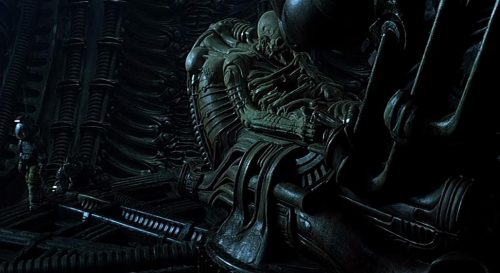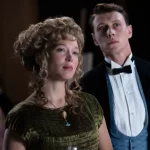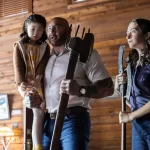10 Directors Who Could Save the Alien Franchise, by Tyler Smith
While some found the recent Alien: Covenant to be a return to form for the franchise, I found the film to be occasionally intriguing, sometimes insufferable, and ultimately forgettable. A bland, by-the-numbers film has no business being a part of the Alien series. Some thought that the problems sprang from the studio’s hesitance to take on bolder material, as it had done in Prometheus, an ambitious, but flabbergasting, mess. Personally, I lay the blame at the feet of director Ridley Scott, whose involvement with the two recent entries was not only ill-advised – he’s certainly not the director he was in the early 1980s – but completely out of step with what made the series so exciting.
And, yes, I know that Alien 3 and Alien: Resurrection were hardly masterpieces. But they effectively continued what James Cameron and Scott himself had started with the first two films. This has always been a series for young upstart directors looking to further explore the already-rich visual world of H.R. Giger and deepen the cynical science fiction premises of Dan O’Bannon and Ronald Shusett. With each new entry, the Alien mythology grew – sometimes logistically, others thematically. Even the lesser films featured moments that have become iconic, not merely in the series, but in larger film culture. In fact, Alien 3 might have actually contributed the singular most memorable shot of the series, with an Alien’s dripping jaws inches away from Ripley’s terrified face.
With Prometheus and now Alien: Covenant, Ridley Scott has undoubtedly attempted to contribute more to the mythology of the Alien series, with his Engineers and creation-obsessed androids, but Scott has become one of the most prolific directors working in the 40 years since the first film. As such, his sensibilities have been well-established, through Black Hawk Down, Gladiator, The Martian, and countless others. There really isn’t much he can pull out of his hat that we haven’t already seen before, visually or tonally.
I would suggest that, if this series is to truly return to what made it great (or at least reliably intriguing), the studio needs to do what it did in the 1980s and 90s and bring in some new blood. The last ten years have seen the emergence of a number of bold and fascinating directors, still in the relative infancy of their careers. Were Twentieth Century Fox to take some risks and bring in a new crop of younger, less proven filmmakers, I think that the Alien series could be energized and once again be an exciting and vital part of the film landscape. Below are ten directors that I think could rejuvenate this flagging franchise.
Honorable Mentions: With his wonderful directorial debut Nightcrawler, Dan Gilroy was able to work within the darkness of the city, crafting a sort of netherworld that springs to life when we all go to sleep. Ben Wheatley has also shown himself to be capable of managing tones both fatalistic (Kill List) and fun (Free Fire). Fede Alvarez‘s Don’t Breathe was a horrifying exercise in Hide-and-Seek that only hints at what Alvarez could do within the never-ending corridors of a spaceship. And I would also suggest that David Robert Mitchell, who burst onto the horror scene with It Follows, could craft such an unrelentingly paranoid Alien film that it could very well be the most stressful of the lot.
10. Jaume Collet-Serra
Possibly the most mainstream director on this list, Collet-Serra is a filmmaker who operates within the world of standard thriller schlock and always comes out the other side with an effective, tense, and tight little movie. He has shown himself able to operate in the dark in the underrated Run All Night and the blinding light in The Shallows. He has made crowd-pleasing action films like Non-Stop and more conventional horror films like House of Wax. Throughout all of his films, though, he has shown himself more than capable of keeping the audience breathless in anticipation, whether it be in a cross-city chase or in shark-infested waters. To turn him loose on a franchise associated with suspense, action, and claustrophobia would be to bring focus and economy to a series that has become increasingly soft and self indulgent.
9. Rodney Ascher
Perhaps the most non-judgmental filmmaker working today, Ascher would bring an oddly-clinical eye to the proceedings. His engaging documentaries Room 237 and The Nightmare displayed the patience of a scientist, standing back and simply watching the fear of his subjects reveal itself. In a series that regularly explores the difference between man and machine, Ascher’s unending fascination with – and purposeful distance from – his subjects could make him a perfect fit, resulting in a film as curious and detached as the Company itself.
8. Craig Zobel
The Alien series is all about being stuck in a confined space with a monster. With his wonderful film Compliance, Craig Zobel was more than capable of evoking both claustrophobia and increasing tension in small spaces. Few directors on this list would be so proficient in exploring the psychological breakdown of various characters in such a terrible situation, and the inevitable blame-shifting that goes along with it. While none of the Alien films have officially been chamber pieces, the structure of these films lends itself to that, and few would utilize the opportunity more than Craig Zobel.
7. J.C. Chandor
With Margin Call, J.C. Chandor showed himself capable of working with a large ensemble of characters, each with their own unique motivations and strengths. He swung dramatically in the opposite direction with All Is Lost, a one-man survival tale in the middle of the ocean. This isolation and steely resolve would also factor into the wonderful A Most Violent Year, but with a much deeper cynicism. Chandor has devoted himself to the various emotional and practical elements of survival, and all the panic and improvisation that it requires. His characters are constantly assessing and calculating, trying to figure out how best to get themselves out of their situation; an element that would serve him well as he told the story of the human struggle against a seemingly-unstoppable killing machine.
6. Robert Eggers
With his pristine The Witch, Robert Eggers crafted a restrained, disciplined folk tale that was just as much about family dynamics as it was any supernatural oppression. With Alien: Covenant attempting (and mostly failing) to explore marriage and couplehood in the midst of a tense situation, the series appears to be veering more towards the effects of horror on domesticity. Eggers could take an already-intimate series and bring it even closer to home, delving into the external factors that can destroy a family, quite literally from the inside out.
5. Derek Cianfrance
With The Place Beyond the Pines, Derek Cianfrance crafted one of the most unique and engrossing films of the 2010s. His willingness to follow the echoes of a character’s actions wherever they may lead could allow for a more metaphysical and ambitious film than the Alien series has seen, much more in line with Prometheus, but with an oddly providential – possibly even inevitable – quality to the story. His quiet command of tone and his desire to depict all elements of a story could allow him to humanize characters that the series might otherwise dismiss, such as the various duplicitous Company employees, trying desperately to get ahead in the world, with tragic results.
4. Dan Trachtenberg
10 Cloverfield Lane is one of the most self-assured, confident feature film debuts I’ve seen in a long time. Trachtenberg’s inherent understanding of space and setting – not to mention an uncanny ability to manipulate sound to create atmosphere – almost begs for him to board a Nostromo-esque spaceship and exploit every nook and cranny for maximum paranoia. Like 10 Cloverfield Lane, a Dan Trachtenberg Alien film would be both crowd-pleasing and uncompromisingly harrowing at the same time, not unlike James Cameron’s masterful Aliens.
3. Jeremy Saulnier
Unflinching and deliberate, Jeremy Saulnier’s Blue Ruin was a triumph of anxious-but-unmerciful vengeance. And with Green Room, Saulnier managed to infuse a claustrophobic thriller with enough horror elements as to effectively shift genres halfway through, not unlike John Carpenter’s marvelous Assault on Precinct 13. Saulnier’s Alien entry would be a particularly brutal affair, almost nihilistic in tone, if not for a close eye towards the all-too-human insecurity of its characters.
2. Jonathan Glazer
With his ethereal Under The Skin, Glazer crafted a film that borders on transcendent. Incorporating elements of science fiction and horror, while completely eschewing any conventional narrative, Glazer captures the perspective of an unfeeling predator who, as Ash would say, is “unclouded by conscience, remorse, or delusions of morality.” At least, that’s how it starts. As the film continues, Glazer allows his character to go on a journey of self discovery, which actually creates moments of unique body horror and surprising emotional vulnerability. To allow Glazer to tackle an Alien film would be to see the visual and philosophical qualities of the series elevated beyond anything we’ve seen previously.
1. Jennifer Kent
It seems somehow unbelievable that a series so identified with a female protagonist (not merely Ripley, but also Shaw and Daniels) has never involved the perspective of a female director. With her brilliant horror film The Babadook, Kent created a uniquely feminine horror story, all the more relevant to the Alien series due to its further exploration of motherhood. With her largely-unseen monster and the increasingly-suffocating atmosphere, Kent’s film is a masterful look at the fear that comes with isolation, an element that the series has been sorely lacking since David Fincher’s ill-fated Alien 3. In fact, with The Babadook, Kent managed to display all the best and most effective elements of the Alien series, both artistically and thematically, and I think she would be an invaluable contributor to the franchise, if only the studio were to stop playing it so safe and return to what made it so exciting in the first place.































